Sunday Morning Chat: Highland Christian’s Bruce Charlebois
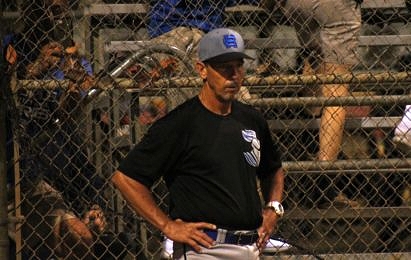
HSBN Editor-in-Chief Rick Duteau sat down with Highlands Christian manager Bruce Charlebois the day after the shooting tragedy at Douglas to discuss all the exciting new changes in the Knights’ program, to talk baseball, faith and how to win at the game of life. While dealing with both personal and public pain at that moment, Coach Bruce opened up to share his beliefs and how to use baseball as a means of coping with all the tough trials in life. Enjoy!
Rick: So coach, you have had an eventful year. You launched your own health conscious juice. You added an indoor hitting facility, and you become the face of the Stealth Organization. Talk a little bit about the whirlwind that has been your life over the past couple years.
Charlebois: Well, I probably look at it differently than a lot of people may. I’ve done my best to be a good steward or manager of a certain amount of stuff that God has blessed me with and given me, and I guess He saw that I did a pretty good job with it so he blessed me with more. We’re really excited, very excited. The grand opening of the building in January was a little different, because it is the worst time of the year to open up an indoor facility to the public. But it certainly is serving a great purpose for our own program. But we haven’t had any rain since we’ve started the season, so we haven’t actually needed to go inside. But it is a nice place to go and it’s the only place we have for batting cages right now, before we get our outdoor cages done. We’re excited about what is going to happen in the summer for sure.
Post-high school season is going to be fantastic. We’re gearing up for that; we’re going to be well prepared for it. Whether it be the renting out of the building and the cages and the facility or whether it be the Stealth stuff that is happening, the number of players and sheep in my flock now has obviously multiplied by an awful lot. We’ve probably gone from about 250 kids a month, whether it be the academy or the high school program or some of our smaller travel stuff that we do, to now we’ve gone to closer to about 750 kids between South Florida baseball clients and guys, as well as our high school guys, some middle school teams that were training and some different things. So we’re really excited about that.
I’m always praying for some more help so that I’m not overworked, and I make sure I maintain my first ministry, which is to my wife and my family. If my house is not in order than none of the rest of it will be, so I am continuing to pray for more help in the area of baseball guys and coaching guys in ministry and things like that. But for me it is multiplying the sheep in our flock, and the most exciting thing for me is it allows me more people to share the gospel with. That is what we use the vehicle of baseball to do, regardless of if it is high school or Stealth or the academy. God does our recruiting and He does it because He wants us to populate the gates of heaven, so that’s what we try to do with the vehicle of baseball and we’ve very excited.
Rick: He only gives you as much as you can handle, but obviously He trusts you with quite a bit by how much you have to handle right now.
Charlebois: The saying right now that I say in a laughing way is that, ‘He won’t give me more than I can handle.’ But right now He’s giving me every single ounce that I can, so I’m wearing a number of hats right now. But things are in order and again, we’ve very excited.
Rick: Last year, your Highlands team was only a step away from the state Final Four, talk a little bit about the process you go through each season to get your team ready to compete in the playoffs?
Charlebois: You’ve probably heard it and written it a number of times by me, and it might seem repetitive, but we spend the early going and the regular season winning the game of life. You’re catching me on a day right now with the tragedy at Stone Douglas yesterday and it is hitting home very close to us. I have a lot of clients with the baseball academy that I train from there, and of course I started my high school coaching career there. I had my academy out in Parkland and I lived out there a long, long time, 13 years, and we have a couple of guys in our own program that lost best friends and another kid who lost a girlfriend. Three out of seventeen deaths are hitting the Highlands program pretty hard.
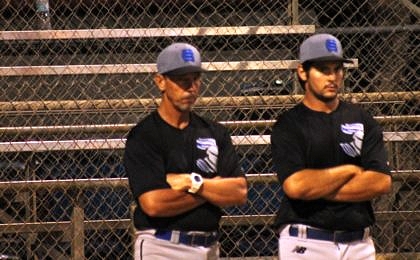
But we spend the regular season dealing with things like this. We haven’t had to deal with anything quite as magnified as this when it comes to a trial, but last year Chad Allen lost his brother in a motorcycle accident. Even though we have a small little program and a small school, we still seem to have a good amount of trials. So we spend the regular season building relationships and try to win the game of life, and try to heal any of the wounds and take any of the masks off any of these young men. We all wear masks and tell everyone that everything is OK. Most of the time everything is certainly not OK in each one of our lives, including you and I, Rick. So we spend an awful lot of time in the regular season trying to win the game of life. Through that process over the course of time, even though we’ve gone to States twice over that time, and last year we were one run away from going to States against a very good club when we ended up losing in the Regional Finals, we tend to be under .500 every time that we go deep into the playoffs. I really and truly believe that that proves the point of what we talk about and what our goal is.
We’ll see some teams go out and go 10-0 and up at 17-3 or 20-3 and get picked off late maybe in a surprise loss, and we’re kind of the other direction in this program. We really and truly do not focus that much on the baseball side of it; we make sure we do our bunt defenses and our first-and-thirds, and we get our swings and we throw our pens and we coach them up in the game of baseball. But we spend an awful lot of time as a team off the field in Bible studies doing devotions together, getting to the field fifteen minutes before practice and I have a lot of meals and a lot of lunches with my players when I know they have some struggles in their lives, and we do some counseling and spend some time together. Then all of a sudden it all clicks late, most of the time, and we make a little run. This year we have quite the skeleton squad, and I have had a lot of them. We had fourteen players on our roster in 2010 when we went to states and our depth was OK on the bench with two or three position guys. This year we do not have that luxury. We have to make sure everybody stays healthy and happy; we don’t have very much depth. But God knew what he was doing and He gave us what He gave us and we’re glad to have it. Again, baseball doesn’t define us. It’s our character that defines us, and we’re proud of that.
Rick: You have been pretty blessed in your coaching career. Who were some of your biggest coaching influences, either past or present?
Charlebois: There are a couple of them. When I played American Legion Baseball for Post 142 in Pompano, when we played at the old Texas Rangers stadium years and years ago, we had a powerhouse American Legion team back when American Legion was really the only thing that was going on. It was big and we had a very good team. But there was a guy that was a wheelchair guy named George Uhl and he showed me humility and strength at an early age that he did not allow the lack of use of either of his legs. He muscled through it on his upper body and got his upper body as strong as he could and he did some things on crutches and just showed me at an early age that the excuses that we make about a bad hop or the excuses that we make about needing another ball because this one’s seams are not good enough, things like that, it just showed me that those things are really so minimal in the big picture. So it gave me a lot of strength and a lot of courage early.
George Petik, who was kind of a staple in our baseball community for years and years coaching at Gibbons, he won states there, he was also my American Legion coach and was a fantastic human being and a great baseball guy. He definitely was a coach that used baseball to build character in all of us back then, so I think it made some very good ground work. Later in life, Coach Easom at Indian River, when I was coming out of high school and going to Indian River for JuCo, he was probably the best total baseball coach that I ever had. He was very hard-nosed and substantially different, but he taught me discipline and structure and preparation and making sure I controlled the things that I could control: me effort, my attitude, things like that. I think that those things really helped me along the way. I think all of them kind of helped me with preparation for team practices and structure in the two or three hours that we have to try and get a lot done, and things like that. There were some other guys along the way, but those are the three that come to mind first.
Rick: So everyone knows coaches spend a lot of time on the field, but there are things the community doesn’t know about. For you, one of those hidden pleasures is playing the drums. Tell me how that hobby got started?
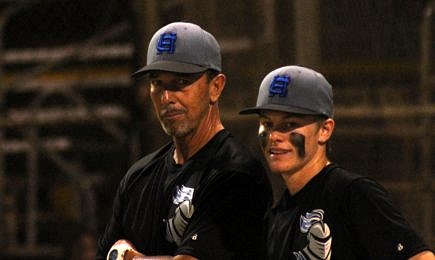
Charlebois: Well, actually, my older brother, who now lives in Nashville, Tennessee, he owns a production studio up in Nashville, so he still does what he loves kind of like I do. He gets to do it every day. He doesn’t get rich doing it; he has a small production company. But he was a drummer for Blue Oyster Cult in the early days, and when I was eight years old I had a 22-piece drum set in my basement in northern New York, up in Watertown, where I was born. It was a 22-piece drum set with a Chinese gong behind it and everything was mic’d up and I used to put the headphones on and play Van Halen “One” and Led Zeppelin and Steppenwolf and “Magic Carpet Ride” when I was eight and nine years old.
I guess it was a gift; it came pretty naturally. He was on the road a lot in the band back then, and so he kind of left it there and said, ‘It is yours when you want it and play it as you will when you want to’, and so I became very passionate about it and I became very good at it, to the point where I could play a 22-piece drum set blindfolded and knew where everything was. Some of those very young drummer prodigies that you can see on youtube now, I was probably not as good as a guy like Avery at six years, which is an amazing young drummer. But that’s where that kind from, and rhythm is something that I’ve always been very good with and I think it’s helped me with sports and athletics. Being able to understand beats of songs, I’ve always been a pretty decent dancer as well. That helps me look half-way decent at a wedding with my wife and sometimes I can throw down with the boys and show them that the fifty-one year old stil has a little bit of juice in the tank.
Rick: Have any of the guys on the team seen you dance or play the drums?
Charlebois: Yes, they have. I don’t know about any of the newer guys, but I have not busted out the drum set in a while. I intend to put it in the building and I am going to start using drumming as a place where guys can go to bang some heads in some down time and maybe put the earphones on and play some music. I really think it helps you with the rhythm of throwing or a pitching delivery, or even a stance to a load to a swing and try to understand the way that it flows. Also being able to take some frustrations out on some drum heads, which I did a lot in my life. I lost a brother to a drunk-driving accident when I was ten, which was devastating for me at a young age, and I remember going to the set and breaking my heads to take some of the frustration out of being angry about that situation. Throughout my life in other situations where my baseball career ended and other things it was a place that I could go to to find peace but also to let go of some negativity that allowed me to clear my head and get back to business.
Rick: You mentioned earlier about Chad losing his brother last year, I’m sure you probably were able to relate a little better having lost a brother at a young age just like he did.
Charlebois: No question about it. I think that the trials that we go through obviously make us better counselors and better teachers, especially if we’re others-centered and we really, really care about people. We would hope that more people than less care a great deal about others. Yeah, I think that is was very important that I had experienced something and we had some ability to relate as he went through that. I don’t know if I made it any easier for him because it is just not easy. But there have been some times in the past where Chad and I were not as close, for different reasons, but I am very, very close with Chad right now, probably in a Top Ten players, which is hard to say as different names pop in my head, and I have been through a lot of trials with a lot of guys, whether it be guys that were addicted to Oxycodon after shoulder surgery and seeing them through that process and taking them fishing on my boat. So there’s always work to be done, and one of my things is that you always need to be working on a project. I think that shows high character. Projects are not always working on an engine. I am not a wrench and I don’t work on engines. But there are going to be projects and you have to be aware and have your head on a swivel and be able to read people’s body language and their eyes to see what they are going through and know that in that particular situation it is a project that you are working on. I think if you are always working on a project it keeps you in a good place.
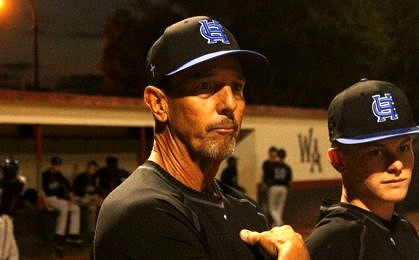 Rick: Players today are on the field almost year-round. You are one of those guys that had your playing career cut short due to injury. How much do you think about that, and how does that affect how you coach your players?
Rick: Players today are on the field almost year-round. You are one of those guys that had your playing career cut short due to injury. How much do you think about that, and how does that affect how you coach your players?
Charlebois: I probably think about it every day at least once, and I also think about my mother’s passing every day and my mom getting Lou Gherig’s Disease, of all things, and dying of that – a baseball player’s disease that’s named after a baseball player. It’s one of those things that I probably think about every day for a brief moment in time. I certainly don’t have pity parties anymore about it, because God had a different plan for my life. I didn’t know it then. I went to a place that was not very good when my career ended and I was reaching out trying to find anything I could get a hold of because I had put all of my eggs in that basket, and it was cut short. And I was a Dude; I led the nation in strikeouts at one point. I was a two-way guy in college, which is very rare. A lot of ink, a lot of MVP awards throughout my career since I was ten years old all the way through American Legion and into high school and everything else. I know for a fact that I had the talent and the skill set to be a Big Leauger for a long time, and be a very, very good one. But god had a different plan and it took me a while to realize how great His plan was for my life. He loves me enough that He still allows me to get up and get to do baseball everyday, in a different capacity now using it as a vehicle to train up young men in a world that probably needs it more than ever right now. I take a lot of pride in knowing what my role is in the community and doing my best to make a difference so that the sheep underneath me in my flock will then go on to have similar character and similar heart, and I think that one soul at a time we can make a difference.
Rick: We spoke earlier about your development of a health conscious juice. You also are big into organic eating. Most young athletes don’t understand the value of healthy nutrition. Give people an idea of how clean eating habits can make a difference in performance.
Charlebois: The whole saying is that you are what you eat. Fueling your body for peak performance, I believe you can have the best coaches and the best instructors and I believe you can have the best gifts and be gifted as a five-tool baseball player, but without fueling your body for peak performance you’re having the big missing link. I also think that it affects the brain and brain functions, your focus and concentration, your longevity and endurance. I believe that at fifty-one years old and in the hot sun for hours and hours every week in Florida and in the summers, and throwing 3,000 baseballs a week and never having a sore arm and things like that and being able to run circles around fifteen and seventeen year olds, and i am still wake-boarding and all those kinds of things and getting a good night’s sleep, I think I am probably a very good witness to the truth of all of those things. With that we were juicing and we tried to put together these Eat-To-Compete programs, because I was very concerned about the highest level guys, skill and talent-wise, that their performance level was just down. So we really dove in, and my wife is a license nutritional specialist, and we have a big passion for it. We tried the eating programs, but it is the shopping and the Whole Foods and people thinking that it is more expensive, but in the long run it saves you on doctor bills. If you eat at home more often and you don’t eat out, it doesn’t become more expensive. You go out and you shop and you have a budget and you can buy healthy food and make good, healthy decisions and still eat at home in a world that is buzz-saw busy. You just have to take the time to do that and make it a priority, and I think that if you do that it makes all the difference in the world.
Rick: You have been coaching for a long time. What is your biggest regret in your coaching career?
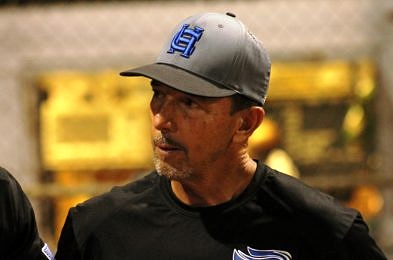 Charlebois: That’s a tough one. You know, as a player, and I know the question is as a coach, but as a player I guess my biggest regret is that I didn’t finish and get the degrees that would give me a substantial backup plan and I did put all of my eggs into a professional baseball career. I majored in child psychology and psych in general, and did not know that I was going to have an academy and have meetings with young kids twelve and thirteen and twenty years old. I really push hard on the schooling now, even with some of my international guys that come over and they are pro guys, as people would say skill-wise and all that. But I really push hard on the schooling and the academics, and I believe that pro ball will be there waiting for them. If they are good enough at eighteen and nineteen I think their stock will go up a lot, and I think also so many more stories like me than ones that made it in The Show. I really believe that young men need to go get their education and finish it, or at least get close enough where they would be able to go back and take their last semester and finish it. But as a coach, I guess my biggest regret, I guess it is really hard for me to answer that question. I try to have the goal of not having regrets.
Charlebois: That’s a tough one. You know, as a player, and I know the question is as a coach, but as a player I guess my biggest regret is that I didn’t finish and get the degrees that would give me a substantial backup plan and I did put all of my eggs into a professional baseball career. I majored in child psychology and psych in general, and did not know that I was going to have an academy and have meetings with young kids twelve and thirteen and twenty years old. I really push hard on the schooling now, even with some of my international guys that come over and they are pro guys, as people would say skill-wise and all that. But I really push hard on the schooling and the academics, and I believe that pro ball will be there waiting for them. If they are good enough at eighteen and nineteen I think their stock will go up a lot, and I think also so many more stories like me than ones that made it in The Show. I really believe that young men need to go get their education and finish it, or at least get close enough where they would be able to go back and take their last semester and finish it. But as a coach, I guess my biggest regret, I guess it is really hard for me to answer that question. I try to have the goal of not having regrets.
Rick: you are the type that you make a decision and you don’t second-guess that decision, I know that about you.
Charlebois: We’ve lost baseball games from what looked like a decision that I made from outside of the fence, but confidently knowing our guys and having great relationships with our guys and knowing how they perform in certain situations, the decisions that we make I am very confident are the right ones. I cannot honestly think of a time where I have a decision that I regret, at this moment in time, Rick. I guess I can’t.
Rick: What is the time you look back on and say, man, that was just a bad coaching move. Something you may have done as a young coach that you wouldn’t do now?
Charlebois: I probably have put some young guys with some high skill talent into big situations in big spots where they were set up for failure at that moment, it long term I believe it helped them to grow into the men and the athletes that they became. I can’t name names for that, because it has happened here a few times. Being here at Highlands this year, we have an eighth-grader starting here at third base. I had eighth-graders starting here last year and he played every inning of every pitch the entire season. That happens here at Highlands Christian. Our numbers are down and it’s a smaller school and our roster numbers are generally very small. A lot of time our younger guys are more skilled than some of our older guys, and a lot of our older guys who have been at Highlands for three or four years will start to want to play baseball in their junior and senior years, even though they ar not baseball players but athletes who play baseball. Those guys will want to be part of what we do here because I think what we do here is pretty special.
Rick: Just going back to the HSBN preseason tournament game here we watched the other night, just using the example of Nick Vaccaro pitching on the mound the other night, it was incredible seeing the outing that he had. I know that was a big moment for the team even though it didn’t lead to the win that everybody would have liked.
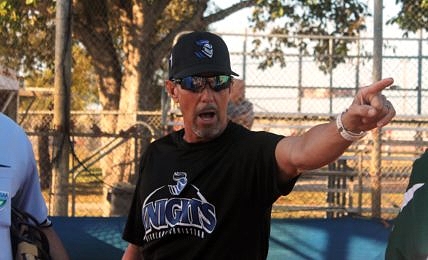 Charlebois: We had Nick Anello starting that game, and he is a University of Miami commit and our freshman ace right now. He earned that role and he threw 31 innings as an eighth-grader last year and he’s an upper 80’s guy with a very elite arm with a very high, competitive spirit. After three innings the game was 0-0 and I let Nick know it was a preseason game and he was done for the night and we are going with Nick Vaccaro. Nick Anello loses his mind a little bit and he wants to win and he wants to stay on the mound and he doesn’t realize the importance of maintaining him well this year, and early on is not a time to go a complete game in a preseason tournament so we can win a baseball game. Being able to have the opportunity to put Nick Vaccaro in that spot, after we started Nick Vaccaro at first base, who coming into this season for varsity he probably didn’t think that he was going to get a shake or a look. He’s going to be trained up and he’s going to be loved on, but didn’t probably think he was going to see the field. But because of circumstances, whether it is because some of the guys came up late as ineligible, which happens here sometimes, as it does other places, we had to be a chameleon and make some moves and make some things happen. What a special moment for Nick Vaccaro to come off that mound dominating with a changeup and making a very good hitting team look not very good. For his confidence to be able to help us with low numbers on a small roster is huge.
Charlebois: We had Nick Anello starting that game, and he is a University of Miami commit and our freshman ace right now. He earned that role and he threw 31 innings as an eighth-grader last year and he’s an upper 80’s guy with a very elite arm with a very high, competitive spirit. After three innings the game was 0-0 and I let Nick know it was a preseason game and he was done for the night and we are going with Nick Vaccaro. Nick Anello loses his mind a little bit and he wants to win and he wants to stay on the mound and he doesn’t realize the importance of maintaining him well this year, and early on is not a time to go a complete game in a preseason tournament so we can win a baseball game. Being able to have the opportunity to put Nick Vaccaro in that spot, after we started Nick Vaccaro at first base, who coming into this season for varsity he probably didn’t think that he was going to get a shake or a look. He’s going to be trained up and he’s going to be loved on, but didn’t probably think he was going to see the field. But because of circumstances, whether it is because some of the guys came up late as ineligible, which happens here sometimes, as it does other places, we had to be a chameleon and make some moves and make some things happen. What a special moment for Nick Vaccaro to come off that mound dominating with a changeup and making a very good hitting team look not very good. For his confidence to be able to help us with low numbers on a small roster is huge.
Rick: If you could wave a magic wand, and correct one thing you think is wrong with high school baseball these days, what would you change, or would you change anything?
Charlebois: I really don’t want to call anybody out in particular, but I certainly think that winning baseball games is a lot less important than winning souls. I think that winning baseball games is a lot less important than coaching character, and I think there is a lot of work to be done in the area of that. I also think that, very similar to teachers, be it elementary, middle school or high school, I think coaches are very, very underpaid. They are gigantic role players in the big picture of our community and our world in general, and I think they play a gigantic role. I think a lot of the times, because the stipends are so low at the high school level, and with fund-raising being at a down now with today’s world and there not being a ton of fund-raising out there, I just think that high school coaching in general is a very underpaid and sometimes not recognized as importantly as a role. I think because of that, sometimes there are coaches that may go minimum requirement in a lot of areas when it comes to off-the-field time with players and counseling more,because of the stipends. I thinks thata’s sad.
Rick: Well, I know you are not one of them. Coach, I thank you for your time, and good luck to you guys this season.








